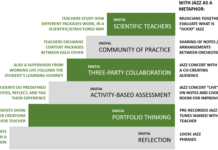Summarizing all the feedback I received on my almost final dissertation (a summary can be found here), what made the strongest impression on me was the interpretation aired by some (more than one) that my work actually can be viewed as an insult on the entire scholarly field of education research. And it’s not the first time I get this reaction, see an earlier blog post here, so it is a pattern worth analyzing further.
So of what consists my arrogant insult? Well, basically they tell me that if it were as “easy” as I in my writing claim it to be to improve education (i.e. by letting students learn through creating value to others, and to do this by asking students to apply a toolbox of entrepreneurship methods) in order to increase engagement, motivation and deep learning in education, the scholarly field would already have come up with this. Allegedly, it is simply too good to be true, or too simplistic to make any real difference, or an eclectic collection of unfounded consultancy models, or in line with previous work that I’ve neglected, or a non-interesting ed-tech app that doesn’t add anything significant of value to practice or research. They ask me to take a step back, appreciate the complexity of education, listen more than I prescribe, refrain from making recommendations to teachers, appreciate previous research more and stop describing previous work in the field in judgmental terms.
Fair enough. I confess to being a bit harsh on current state of education, both in terms of practice and research. I have probably let my frustration over lack of progress shine through in a non-academic way. I really need to better appreciate what has already been done, and to be more careful with judgmental wording. After all, we do have some truly beautiful theories, learning principles and educational philosophies out there.
More in detail, for the sake of clarity here, I have been informed that some of my work as it is presented now doesn’t help a single teacher, that I am being merely irritating, that my writing can be viewed as an insult on decades of progressive education researchers, that I am pushing them to the floor with my work, that I am un-humble, and that I am excluding / devaluing a lot of good work with my too narrow definition of “entrepreneurial” education. It seems my attempts to clear the fuzziness in the field by being explicit is one root cause here.
So, what to do now? When, and to what extent, is it right to listen to the critics, step back and observe more, to follow the advice to be more humble? Or, if my conclusion would go the other way, when is it right to say, hey, this actually seems to work. Should I keep being explicit despite the risk of being viewed as irritating, or should I back off, observe more, be less explicit and talk less? I’ve received rather conflicting advice pointing towards either of these diverging paths. Some would perhaps argue that a little bit of both is necessary now – which is easy to agree on in theory but a difficult balancing act to make in practice.
What do you think? Tweet me, e-mail me or reply here on the blog.
NOTE: For the record, I did get a lot of positive feedback too. From many different people including my fantastic discussant Saras Sarasvathy – she was world class and gave some fantastic feed forward. But that is a different story which I might get back to later here.







